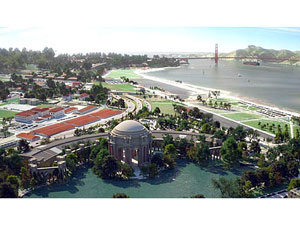In a board hearing on May 20, the California Transportation Commission approved a request from Caltrans and the San Francisco County Transportation Authority to use a public-private partnership on phase two of the Presidio Parkway project.

The $1-billion project, which will demolish the current Doyle Drive southern approach to the Golden Gate Bridge and construct a six-lane replacement facility through the Presidio park, is currently in the first phase, which includes the first four contracts; contracts five through eight now would be financed through a private developer.
The California Transportation Commission (CTC) approval was praised by Gov. Schwarzenegger (R), the American Council of Engineering Cos. (ACEC) California, the P3 sponsors Caltrans and the San Francisco County Transportation Authority, but it was slammed by the public engineers union. The Professional Engineers in California Government (PECG) characterized the decision as “an illegal waste of hundreds of millions of taxpayer dollars.”
The P3 proposal came about after last year’s passage of Senate Bill XX4, an amendment to the state Streets and Highways Code. It allowed the use of P3s to deliver some projects in California, and Schwarzenegger lauded the legislation as a way to build transportation projects “more efficiently and achieve faster delivery while transferring risk to the private sector and reducing overall project costs.”
Presidio Parkway is the first project to be brought before the CTC for P3 approval. Initially, the CTC staff under Executive Director Bimla Rhinehart did not recommend a P3 for the project due to questions about State Transportation Improvement Program (STIP) funding and whether P3 projects are required to include tolls or user fees.
“I applaud today’s action by the California Transportation Commission,” says Schwarzenegger. “We all know that consumers win whenever there’s competition, and today’s action demonstrates that government services can benefit from that basic principle as well. Public-private partnerships are an important tool that can help rebuild California’s vital infrastructure while saving taxpayer dollars. As a gateway to the historic Golden Gate Bridge, the Presidio Parkway can be a shining example of how to improve the state’s highways through competition and innovative public-private partnerships.”
“Presidio Parkway is a badly needed project to improve traffic mobility and public safety in the San Francisco approach to the Golden Gate Bridge, and it can now move forward expeditiously,” says Paul Meyer, executive director of ACEC California. “The project is a high-standard solution for meeting tomorrow’s traffic needs and safety standards.
“Thanks to SB XX4, California is now able to utilize—albeit it on a limited basis—what has become a valued and accepted project-delivery system throughout the world. Not every project is appropriate for a P3 delivery, but public agencies now have a valuable tool for speeding up the delivery of needed projects without having to take on all the risk—and that is a very positive development for California taxpayers,” Meyer says.
“This is a great moment for infrastructure in California,” says Jose Luis Moscovich, San Francisco County Transportation Authority executive director.
Moscovich adds that SB XX4 does not require tolls or user fees, but that the state Legislature needs to work through some issues about specific funding.
“It is disappointing that the California Transportation Commission chose to ignore its own staff and legal-counsel recommendation and approve this proposal despite opposition from every local and regional transportation agency [that] testified,” says Bruce Blanning, PECG executive director. “Eliminating competitive bidding to put a fully funded project in debt for the next 30 years will cost the Bay Area jobs, increase traffic congestion and waste more than a half-billion taxpayer dollars. That is irresponsible and inexcusable.”
Prior to the vote, PECG ran one-minute radio ads in the state refuting the benefits of P3s.
Under the P3 proposal, a private developer now would be engaged to design, build, finance, operate and maintain the Presidio Parkway projects over 33 years. The developer would be paid a $173.4-million milestone payment at the end of construction, with availability payments, estimated by the CTC, to be between $1.131 billion and $1.383 billion over a 30-year period. Users would not be assessed tolls, the proposal says, and availability payments would be made primarily from the State Highway Account.

Post a comment to this article
Report Abusive Comment